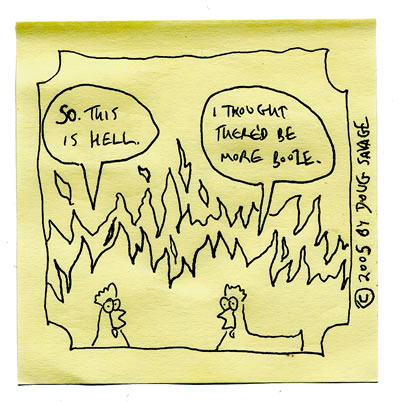I listened to an interesting interview the other day. Bruxy Cavey (from the Meeting House) was interviewing science-journalist, author and devout Catholic Denyse O'Leary about her latest book "The Spiritual Brain: A Neuroscientist's Case for the Existence of the Soul" [on Amazon.co.uk]. Sounds like a very interesting book and I intend on reading it once it comes out in paperback.
 But one of the things she said, which really caught my attention, was her reasoning that hell must be a real place. The reasoning went like this:
But one of the things she said, which really caught my attention, was her reasoning that hell must be a real place. The reasoning went like this:
Her reasoning seemed a bit simplistic to me. For a start, while I believe that we do indeed have freewill, I don't know that for certain. The belief can only be inferred from the bible, it isn't explicitly in there.
Furthermore, Jesus (in Matthew 10v28) says explicitly that there is one (assumed to be God) who can destroy the soul and body in hell. If the soul can be destroyed, it can't be immortal. Of course, Jesus asserts the existence of hell in this verse (and others) but the reasoning above can't be used to prove it.
 But one of the things she said, which really caught my attention, was her reasoning that hell must be a real place. The reasoning went like this:
But one of the things she said, which really caught my attention, was her reasoning that hell must be a real place. The reasoning went like this:- We know the soul is immortal
- We know we have freewill
- Thus, it must be possible for someone to choose to have the worst eternity possible, therefore there must be a hell.
- Of course, it may be that nobody has ever gone there or ever will, but it must exist.
Her reasoning seemed a bit simplistic to me. For a start, while I believe that we do indeed have freewill, I don't know that for certain. The belief can only be inferred from the bible, it isn't explicitly in there.
Furthermore, Jesus (in Matthew 10v28) says explicitly that there is one (assumed to be God) who can destroy the soul and body in hell. If the soul can be destroyed, it can't be immortal. Of course, Jesus asserts the existence of hell in this verse (and others) but the reasoning above can't be used to prove it.
3 comments:
I have a copy of 'The Spiritual Brain', it quite good if only for debunking the 'against arguments'. I found it to have quite a bit of anti-climax about it.
I wished I had read this book 5 years ago so I had some response to my atheist Psychology lecturer.
It doesn't clear much up, but it does explain how much monist theory is incompatible with what we experience in life.
I must admit, one of the reasons the interview made me want to read the book was that the interview actually didn't really address the majority of the arguments that I assume the book deals with.
But given that you say it "doesn't clear much up" and describe it as an "anti-climax" I don't think it'll jump to the top of my 'books to read' list (currently 4 unread books on the shelf in the bedroom and about another 20 on my 'wishlist'. Sigh. Too many books, too little time)
R.
Surely free choice doesn't require infinite choice! It's a really surreal argument, as the fact that I get to decide between trousers in the morning does not also mean I get to decide which way the world spins. What about the person who chooses a medium eternity? Surely you will need infinite proliferation of alternative afterlives for every possible choice, unless you can incorporate all the people's choices in a smaller framework, leading to happier and nastier bits of hell, as well as boring bits in heaven.
Amazing where you can get to from certain positions isn't it!
Post a Comment